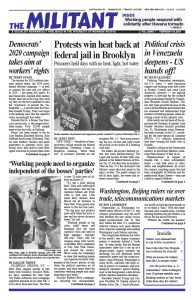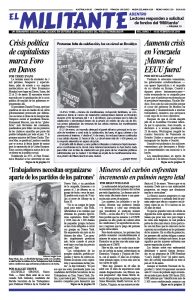Negotiations in Washington between senior officials of the U.S. and Chinese governments over the tariff duel between the two ruling classes ended inconclusively Jan. 31. Two days before the talks U.S. authorities indicted Chinese tech giant Huawei over corporate espionage and evading Washington’s anti-Tehran sanctions.
The competition between the rulers of the world’s two largest economic powers is routinely dubbed a “trade war” by news media. But the Huawei indictments show this is the tip of a deeper-seated contest between the declining, but still dominant, world imperialist power and the rising economic clout of Beijing. Washington is using tariffs, sanctions and legal action to protect its economic and technological supremacy against Beijing. And, in the background, a debt-driven global capitalist downturn threatens.
President Donald Trump and Chinese President Xi Jinping agreed in Buenos Aires, Dec. 1, to put new punitive tariffs on hold for three months to try to forge a “deal.” With that deadline now only a month away, a further meeting between the two leaders is in the air for the end of February.
“Without the tariffs, we wouldn’t be talking,” Trump told the New York Times after the trade meetings. He said he expected “some significant changes” to Beijing’s economic policies at further talks. He released a letter showing Beijing intended to increase imports of U.S. soybeans.
President Trump’s threat is to increase duties on Chinese imports into the United States from 10 to 25 percent. Facing a real slowdown in production, the Chinese rulers are keen to avoid this.
Fight for telecoms supremacy
The U.S. rulers are also pressing Beijing to end forced transfers of new technology from foreign investors to Chinese partner firms and ease other state protections of its large market. Through the “Made in China 2025” plan, Beijing hopes to challenge Washington’s dominance in tech production and profits.
Washington’s 13 new indictments against Huawei stem from long-running probes into the world’s largest telecommunications firm. U.S. prosecutors allege widespread industrial espionage by the Chinese company, close links to Beijing’s cyber-warfare efforts, as well as financial and legal deception in circumventing U.S.-imposed sanctions against Iran.
The FBI, the U.S. rulers’ top domestic spy agency, cited emails from 2013 showing Huawei rewarded its employees worldwide for industrial espionage. Huawei was charged with stealing trade secrets from its U.S. competitor T-Mobile, including theft of a complete robotic arm intended to be duplicated in China.
Such theft on all sides is a common part of the dog-eat-dog workings of capitalism. In 2010, the National Security Agency secretly broke into Huawei’s headquarters in an operation code-named “Shotgiant.”
Meng Wanzhou, Huawei’s chief financial officer, also faces charges. She was detained in Vancouver, British Columbia, Dec. 1, and is now engaged in a court battle trying to prevent her extradition to the U.S.
At stake is which capitalist power will dominate the cellular electronic technology known as 5G. This will revolutionize the speed and power of cellphones and other central infrastructure. It is vulnerable to cyber espionage by rival companies and governments alike.
In going after Huawei, FBI Director Christopher Wray spoke on behalf of the U.S. rulers when he said that firms like Huawei “pose a dual threat to both our economic and national security.”
The governments of the U.S., Australia and New Zealand have banned Huawei’s participation in developing their 5G networks. British Telecom, Deutsche Telekom, and Vodafone place restrictions on Huawei’s involvement.
Governments in “emerging nations” in Latin America, Asia, Africa and the Middle East have less qualms in deploying Huawei’s cheaper equipment. They don’t have a stake in Washington’s conflicts with Beijing.
As James Politi wrote in the Jan. 20 Financial Times, there are concerns among the U.S. rulers “that China is winning the race to develop the technologies of the future, and needs to be stopped — for economic, strategic and military reasons — if the U.S. is to retain its global dominance in the twenty-first century.”

